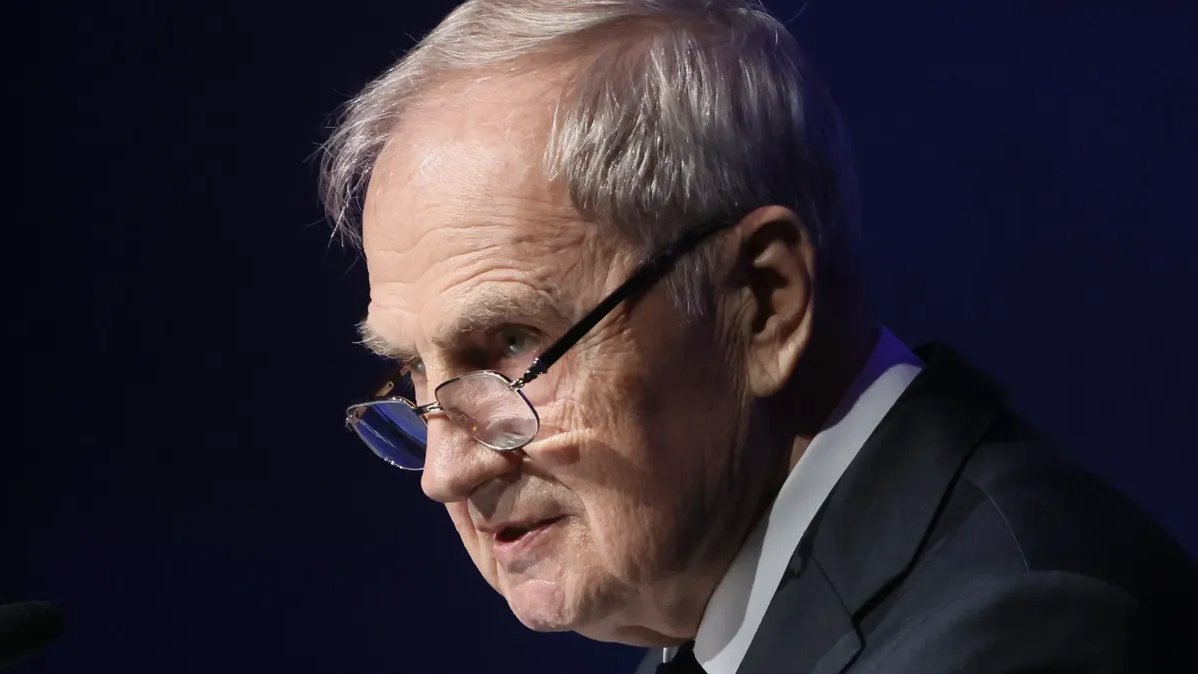This year, Valery Zorkin, chairman of the Russian Constitutional Court, turned 80 years old. For the last 20 of them, he’s been an indispensable figure for the Kremlin, granting top-down approval and legalisation for all its initiatives. Zorkin has authorised Russia’s non-compliance with European Court of Human Rights (ECHR) decisions, the removal of presidential term limits in Russia, its annexation of Ukrainian territory in 2014 and 2022, and its war in Ukraine. Under Zorkin’s leadership, the court has approved all the repressive laws of our day and made submission to authority a hallmark of the Russian judicial system.
In return for these efforts, the Kremlin has granted him political “immortality”. Today, Zorkin is the only judge in Russia who can be reappointed indefinitely — and whose term knows no age limit.
Technically, judges — and especially those on the constitutional court — are forbidden from engaging in politics. But Zorkin has never observed this mandate. He was outspoken about his political opinions in the 90s, when a conflict with Boris Yeltsin first brought him fame, and he has remained political ever since — denouncing Perestroika in state newspapers, berating the West, and lecturing on the “spiritual bonds” that should prevail over legal ones.
Zorkin gives the Kremlin a formal legal foundation. Take that foundation away, and the whole house could fall down.
Here, Novaya Gazeta Europe presents a portrait of the Constitutional Court chairman, recapping his key career milestones and the political path that brought him where he is today.
Early career and Yeltsin years
Valery Zorkin was born in 1943 in the Russian Far East, near the Chinese border. He attended Moscow State University, earning a degree in jurisprudence and writing his graduate thesis on the works of a liberal Russian jurist, Boris Chicherin. He also wrote a doctoral dissertation on legal positivism — a theory whose adherents included Stalinist prosecutor Andrei Vyshinsky.
Though he failed to defend the dissertation the first time, Zorkin ultimately received his PhD and became a professor, lecturing on Marxism-Leninism first at the Institute of State and Law, then at the Academy of the Ministry of Internal Affairs.
After winning a seat on the Constitutional Court in 1991, Zorkin became a vocal advocate for the “super-presidential model” of the new Russian state, opposing the alternative parliamentary system. He convinced his colleagues on the court that only a presidential system could provide much-needed political stability for the new Russian Federation.
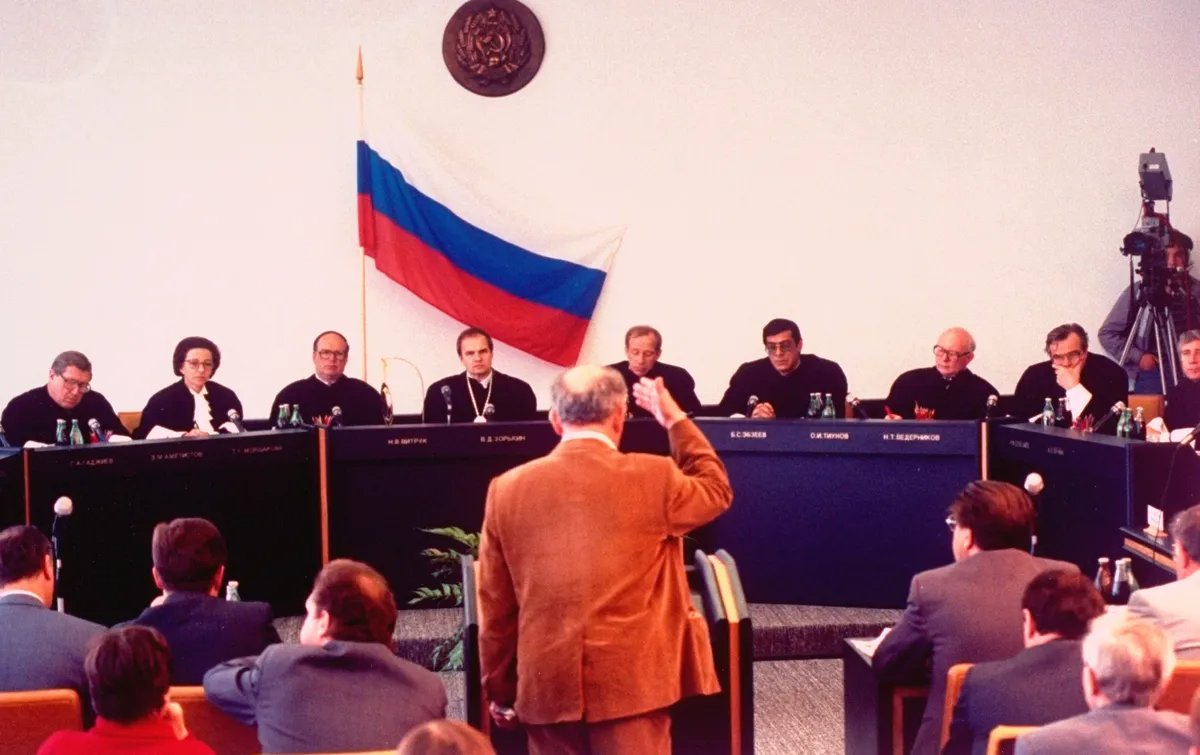
Valery Zorkin (centre) chairing a Constitutional Court session, 1992. Photo: Sergei Guneyev/Getty Images
But despite his support for the presidential system, Zorkin soon came into conflict with the first Russian president, Boris Yeltsin. As soon as he joined the court, Zorkin had allied himself with one of Yeltsin’s foremost detractors, then-vice president Alexander Rutskoy. Between 1991 and 1993, Zorkin declared many of Yeltsin’s decrees unconstitutional and rejected other legislation proposed by the president. The conflict with Yeltsin came to a head in 1993, in the events leading up to the Russian constitutional crisis. Flouting the traditional separation of judges from politics, Zorkin condemned Yeltsin’s actions in editorials, published statements, and frequent television interviews, informing citizens that Yeltsin had “trampled on the most important principles of the constitutional order” by assuming “the role of an absolute ruler”. (This remark takes on obvious irony in light of his later allegiances.) “Boris Nikolayevich, you’ve put yourself outside of the Constitution!” he exclaimed in one interview. “Get back into it!”
Zorkin’s stance on Yeltsin was so overtly political, in fact, that it made some of his fellow judges squeamish. In the summer of 1993, several of his subordinates published a letter in which they wrote that Zorkin had gone too far, crossing the line between judicial and political activity.
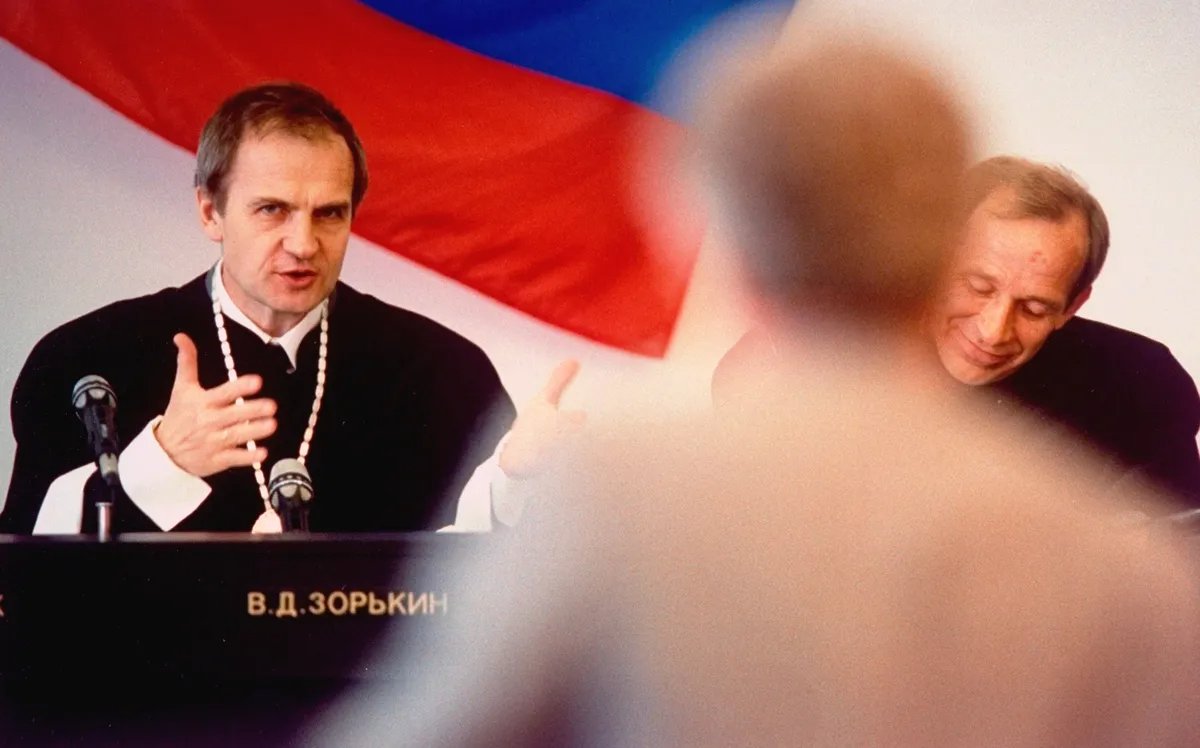
Valery Zorkin (left). Photo: Sergei Guneyev / Getty Images
Following the crisis in October 1993, in which Yeltsin prevailed over would-be conspirators including Rutskoy, Zorkin was temporarily removed from the Constitutional Court after his colleagues accused him of participating in politics.
But the punishment lasted only a few months; Yeltsin, bearing no grudge, restored Zorkin’s position in the court in January 1994. For the rest of the decade Zorkin faded from public view. He surfaced again in the early 2000s, with the election of a president whose views he apparently found much more favourable.
Mid-career
In February 2003, then-chairman of the Constitutional Court, Marat Baglai, reached the age limit of 70 and resigned. The judges of the court elected Zorkin to replace him for what was then a three-year term.
The election of Zorkin set off alarm bells in the new administration. Everyone remembered the trouble he had caused for the executive branch in the early 90s.
Zorin’s election was “a shock”, said Gleb Pavlovsky, a now-deceased political scientist who once worked closely with the Kremlin. Officials in the presidential administration even considered attempting to reverse the court’s decision, he said. But they decided any intervention would cause a “huge scandal”, since electing a chairman was considered the judges’ prerogative.
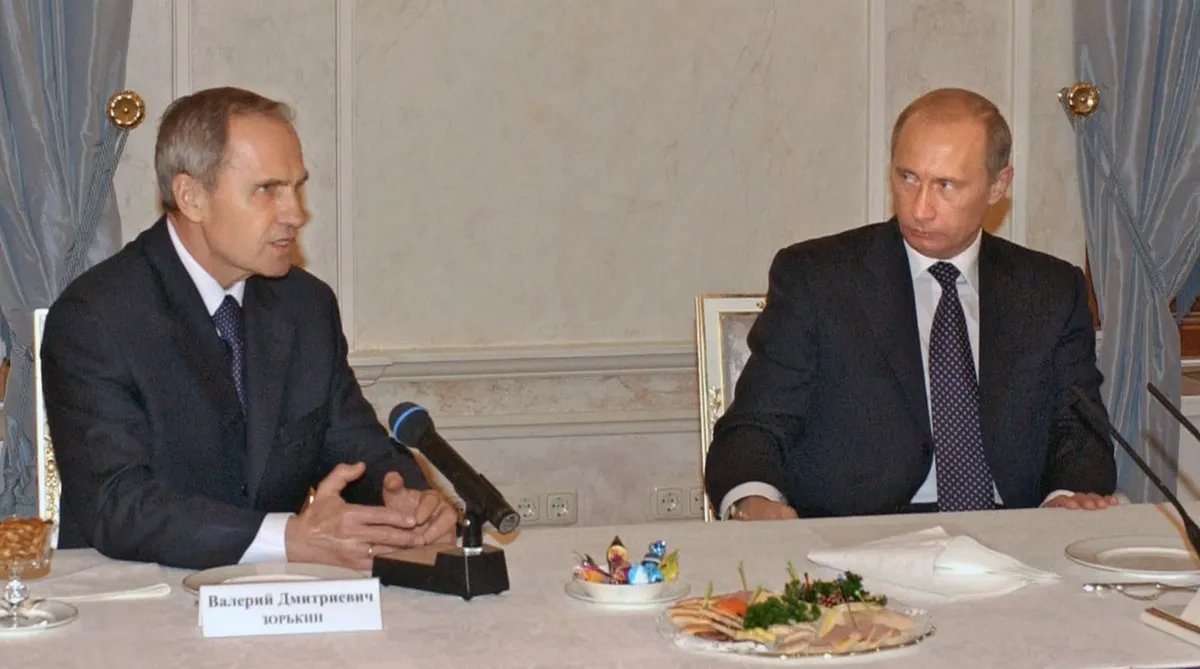
Vladimir Putin and Valery Zorkin (left), 12 December 2004. Photo: EPA / PRESIDENTIAL PRESS SERVICE / ITAR-TASS POOL
Moreover, conversations with Zorkin himself “calmed” the Putin administration’s fears, Pavlovsky said. It became apparent that Zorkin’s ideological beliefs were aligned with the new executives’ and posed no threat. Indeed, in the 20 years since then, Zorkin has not deemed a single presidential decree unconstitutional.
One high-profile case Zorkin ruled on early in his term concerned gubernatorial elections. After the terrorist attack in Beslan in 2004, the Putin government moved to change the law so that governors would be appointed from above rather than elected directly by constituents. The President claimed that strengthening the “vertical of power” in this way was necessary for “combating terrorism”. Zorkin’s court approved the change, saying that it was justified by the “developing socio-historical context”.
Zorkin’s court authorised all of the Kremlin’s other major legislative changes throughout the next decade. In 2014, it deemed the first “foreign agent” law constitutional. That same year, it also confirmed the constitutionality of the annexation of Crimea — a decision that the court reached in just three hours. (Following this ruling, the Constitutional Court of Russia was expelled from the Conference of European Constitutional Courts.) In 2017, Zorkin’s constitutional court permitted the Russian government to disregard a ruling of the ECHR — the first time such a ruling had ever occurred in any European country. In 2018, the court approved the disqualification of Alexey Navalny — whom Zorkin had called a “threat to democracy” — from the presidential elections.
In 2020, the court approved the elimination of term limits for Putin, and in 2022, it found a constitutional basis for the “accession” to Russia of the Luhansk, Donetsk, Zaporizhzhia and Kherson regions.
Zorkin’s editorials
Over the last 20 years, Zorkin has written dozens of opinion pieces for the state newspaper Rossiyskaya Gazeta. In his essays, which are often long and chaotic, he rails against everything from opposition rallies to Western enemies to perestroika (which he considers “disastrous”) and Yeltsin (who “trampled on the Constitution”).
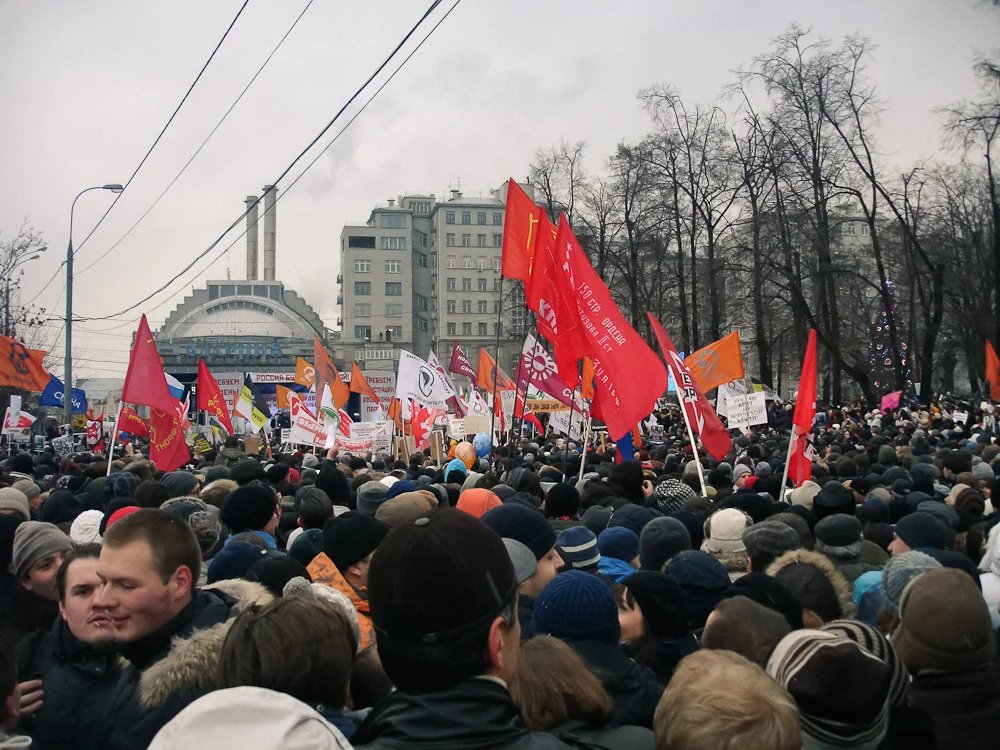
An opposition rally in Moscow’s Bolotnaya Square. Photo: Wikimedia Commons, CC BY-SA 3.0
Zorkin’s denunciation of Gorbachev’s perestroika, which he has called “chaos [...] without a moral basis,” were so strong that they provoked a published response from Gorbachev himself.
Gorbachev reminded Zorkin that the elections of 1989 and 1990 were the first free ones in Russia for many generations. This period, he continued, also saw the release of political prisoners, the opening of borders, and nuclear disarmament. “Don’t you see ‘positive moral content’ in any of this?” Gorbachev asked Zorkin, who did not respond.
If Zorkin’s perspective on perestroika is decidedly anti-nostalgic, he does take a surprisingly wistful view of the times of serfdom. Though he admits serfdom had its “costs,” Zorkin wrote in Rossiyskaya Gazeta that it formed the “spiritual glue” of the Russian state and was responsible for the “internal unity of the nation”.
He evoked the same spiritual glue — or, more literally, spiritual “bond” — in 2014 to justify his ruling on the annexation of Crimea. Responding to Elena Lukyanova, a prominent jurist who opposed the annexation, Zorkin wrote that because Russia was held together by “spiritual bonds”, it could afford to “disregard [...] legal bonds” to some degree.
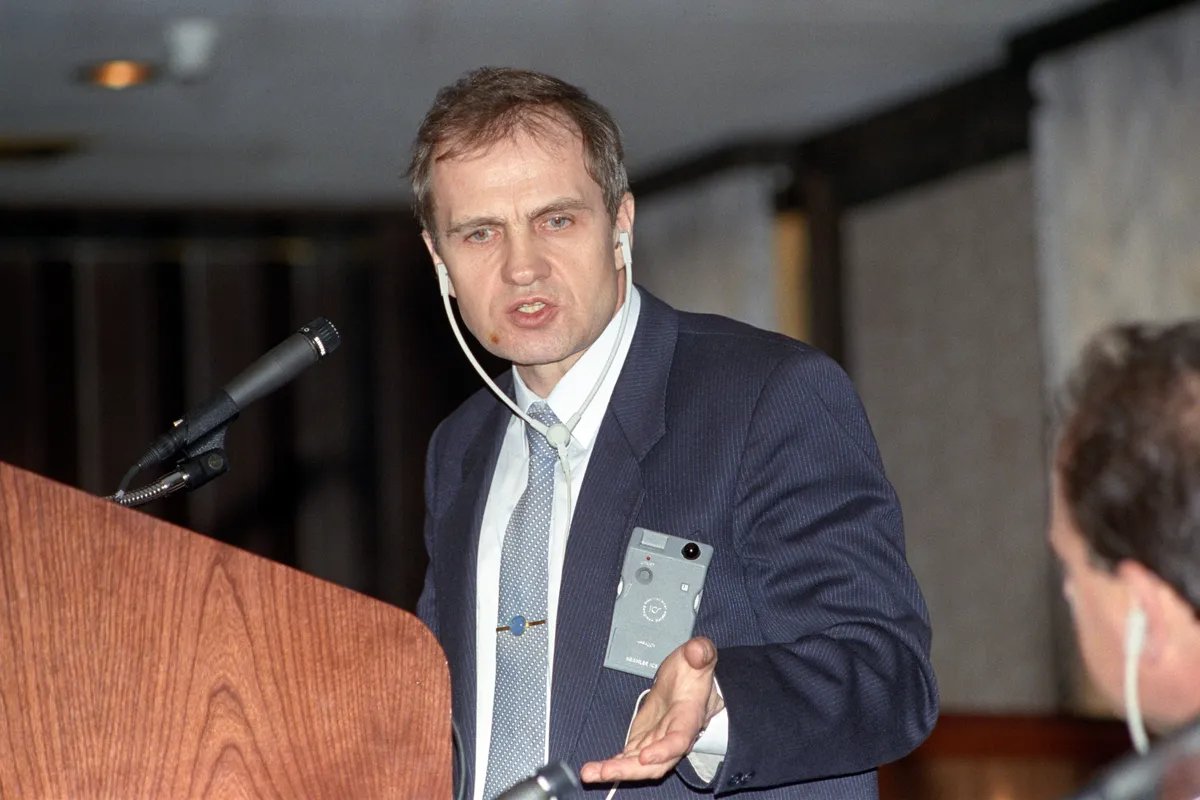
Valery Zorkin in April 1993. Photo: EPA / VITALY ARMAND
Zorkin today
This May, 14 months into Russia’s full-scale invasion of Ukraine, Zorkin brought President Putin a map of Europe from 1674. “Vladimir Vladimirovich,” he said, “there is no Ukraine there.”
Now in his ninth decade, Zorkin lives in St. Petersburg’s ultra-expensive Krestovsky Island and remains one of Putin’s most important political allies. In March, the president awarded him the Order of the Holy Apostle Andrew for “outstanding services to the Fatherland”.
Recently, his court upheld the constitutionality of a law that prohibits “discrediting the army”, which is now used to silence and imprison any dissenters. Among them is politician Ilya Yashin, who was sentenced to eight and a half years in prison. In Zorkin’s decision defending the law, he wrote that the goals of the special military operation were “constitutionally predetermined” and that the state itself was a “constitutional value”.
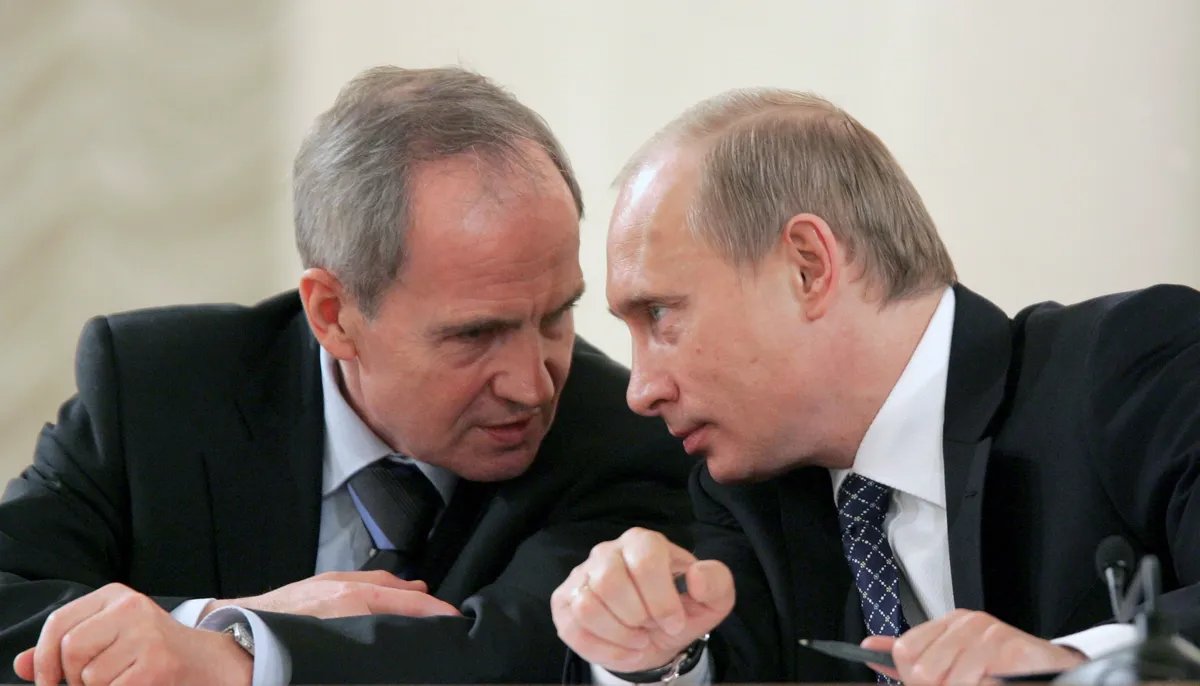
Valery Zorkin and Vladimir Putin. Photo: EPA / SERGEI KARPUKHIN
Russian political scientists see Zorkin as essential to the current regime. Ekaterina Mishina, Professor at the Free University, predicted that Zorin “will be kept in office until the very end, especially if Putin is replaced by some ideological clone.” She added that Zorkin could serve as a “litmus test” for a new administration, revealing its willingness to establish an independent judicial system with an unbiased Constitutional Court.
Zorkin’s current term will expire next year — the same year that Putin will seek re-election. The Constitutional Court Chairman is eligible to serve a seventh term and limitless others after that, since judges can now be re-appointed indefinitely. So unless major changes are made to the current Russian system, Zorkin is likely to stick around for a long time yet.
Edited by Lucy Silbaugh
Join us in rebuilding Novaya Gazeta Europe
The Russian government has banned independent media. We were forced to leave our country in order to keep doing our job, telling our readers about what is going on Russia, Ukraine and Europe.
We will continue fighting against warfare and dictatorship. We believe that freedom of speech is the most efficient antidote against tyranny. Support us financially to help us fight for peace and freedom.
By clicking the Support button, you agree to the processing of your personal data.
To cancel a regular donation, please write to [email protected]
